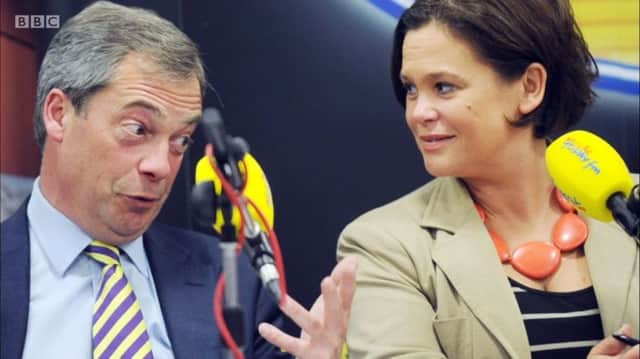Sam McBride: Inherent tension in Sinn Féin’s EU stance will be difficult to balance


In an interview with The New Statesman during a visit to London, the Sinn Féin leader lauded the EU’s decision two years ago that in the event of a vote for a united Ireland then Northern Ireland would automatically re-join the EU.
In the context of Brexit, that decision had “added an additional dimension to the Irish unity question”, she said.
Advertisement
Hide AdAdvertisement
Hide AdBut the following day Sinn Féin turned its political guns on the EU, with salvo after salvo from senior party figures and the description of unspecified EU leaders as “war mongers”.
In a move which provided an opportunity for electioneering ahead of the European election next month, the party’s defence spokesman Aengus Ó Snodaigh introduced to the Dáil the Thirty-Eighth Amendment of the Constitution (Neutrality) Bill, an attempt to enshrine in the Republic’s constitution the principle of Irish neutrality.
Mr Ó Snodaigh urged Leo Varadkar and Simon Coveney to “pull back from the headlong rush to an EU army” and he told the Tánaiste “on this issue you don’t need to be the best boy in the class. You can take a firm stand against the EU war mongers”.
Sinn Féin’s move is part of wider concern, mostly on the left, about the moves towards what some powerful EU figures – including Angela Merkel and Emmanuel Macron – envisage as an EU army. Last year Ireland joined the Permanent Structured Cooperation (PESCO), which increases Irish spending on defence and integrates it further with other EU nations’ militaries.
Advertisement
Hide AdAdvertisement
Hide AdThe party drew up a poster with the words ‘No EU Army’ and the image of a tank crossed out. Its Northern Ireland MEP, Martina Anderson, called for a referendum to prevent the Republic “blindly following the path of EU militarisation” and being “sleepwalked into a European Army”.
The Taoiseach, backed up by Fianna Fáil, has rejected the criticism, arguing that “a Europe that’s worth building is a Europe that’s worth defending” and that it is necessary for Europe to defend itself rather than relying on the US. He also argues that Ireland will be able to opt out of certain PESCO elements.
Regardless of what happens, the issue is emblematic of a wider difficulty for Sinn Féin – its inherent Euroscepticism which survives in the south now sits uneasily alongside its fervently pro-EU pitch in Northern Ireland.
Sinn Fein argues that there is no conflict between these two positions; that it can be a sceptical of the EU project without being against it in its entirety.
Advertisement
Hide AdAdvertisement
Hide AdThat strain is likely to be amplified over time as the EU moves towards greater unity, a problem for a nationalistic party, and in an increasingly corporate direction with developments such as the Transatlantic Trade and Investment Partnership (TTIP) – a problem for a party which sees itself as being well to the left on the political spectrum.
And the nature of being part of a club of 27 is that individual states, and particularly small states, cannot get everything they want. They can be out-voted and outmanoeuvred. If that happens on issues which are fundamental to Sinn Féin’s political philosophy, what then?
Until recently, the choice in those circumstances would have been obvious – Sinn Féin would have reverted to its historic position of arguing to leave the EU, thus repatriating all sovereignty to the island of Ireland.
But since Brexit the party has increasingly shackled the case for Irish unity to the Republic’s continued membership of the EU.
Advertisement
Hide AdAdvertisement
Hide AdThe issue also potentially brings Sinn Féin’s southern ambitions – where it is seeking to stress its left-wing credentials to eat into the vote of the Irish Labour Party, People Before Profit and socialist independents – into conflict with its grander goal of removing the border.
To win votes in the south, where left of centre politics is a competitive field and Sinn Féin’s poll ratings have been mediocre for some time, it may be necessary to denounce the EU.
In the north – if Sinn Féin is right that the EU is a key plank towards achieving Irish unity – those noises are likely to be confusing and counterproductive.
A recent BBC Spotlight documentary excavated embarrassing footage from several years ago of Sinn Féin’s then deputy leader, Mary Lou McDonald, sitting beside Nigel Farage as they jointly argued against what they saw as further EU encroachment on national sovereignty.
Advertisement
Hide AdAdvertisement
Hide AdThe image jars with Sinn Féin’s current denunciation of Brexiteers and the whole notion of wanting to leave the EU. And yet it is philosophically more consistent with Sinn Féin’s historical ideology than where the party now finds itself.
In the 1975 referendum on the UK entering the then European Common Market – an arrangement with far less implications for national sovereignty than the modern EU – Sinn Féin was campaigning on the same side as the late Ian Paisley. In the south, it did likewise.
And prior to Brexit, Sinn Féin in the Republic has repeatedly criticised “the austerity policies of the EU” and accused the European Central Bank of having “absolute disregard” for national democratic institutions.
This week’s row about an EU Army shows that while those positions are now less often heard in public, they endure unseen.
Advertisement
Hide AdAdvertisement
Hide AdIn any border poll, Sinn Féin will have an already difficult task of convincing non-nationalists to support Irish unity. If a key element of the party’s appeal to those people is a pro-EU message, even that element of the task will be undermined if the party is perceived to be cynically contradicting its own beliefs.